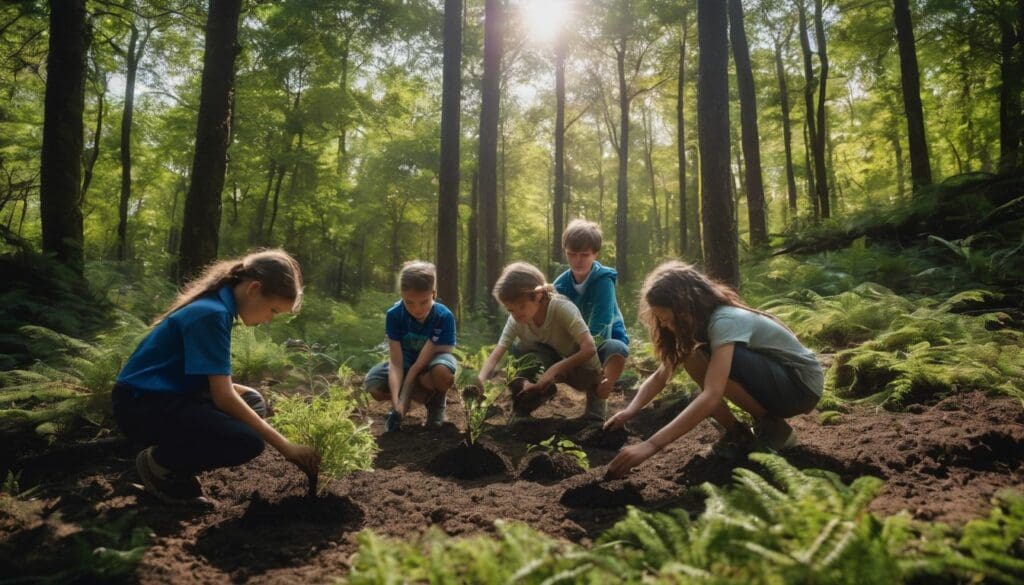Climate change is a challenge that affects us all, especially future generations. Young leaders are stepping up, bringing fresh perspectives to environmental education. This article explores how nurturing these young minds can lead to lifelong stewardship of our planet and stronger communities.
Dive in to discover the power of youth!
Key Takeaways
- Young leaders are essential in combating climate change and achieving Sustainable Development Goals by bringing innovative ideas and enthusiasm to environmental education.
- Youth leadership development in environmental sustainability boosts confidence, imparts crucial skills like critical thinking and problem-solving, and empowers young people to act as agents of change within their communities.
- Including diverse youth voices in climate discussions enhances understanding of environmental challenges and promotes equity in conservation efforts, leading to more inclusive solutions.
- By engaging in advocacy campaigns, public speaking, and community projects, young individuals gain empowerment through increased confidence which inspires others towards a sustainable future.
- Empowering youth with informed decision – making capabilities is key for fostering a generation that is environmentally conscious and equipped to address global conservation challenges.
The Importance of Youth Leadership in Environmental Education
Young people today are pivotal in shaping a sustainable future. They bring fresh perspectives and innovative ideas to environmental education, making them indispensable for meeting our Sustainable Development Goals (SDGs).
As they learn about conservation and sustainability, these young leaders develop the skills required to drive positive change in their communities and beyond. Their enthusiasm for protecting the planet empowers peers and older generations alike, showcasing how activism can lead to tangible results.
Encouraging youth leadership within this field ensures that upcoming generations possess not only awareness but also the capacity for environmental stewardship. It sparks a chain reaction of community engagement and advocacy that is critical for amplifying voices dedicated to climate action.
With empowered young minds at the helm, we create an unstoppable force against environmental challenges, ready with solutions that stem from education combined with passion. The next step involves integrating these dynamic youths into broader climate conversations to further enhance their impact on conservation efforts.
Expected Outcomes of Youth Leadership in Environmental Sustainability
Youth leadership in environmental sustainability can lead to increased confidence and the development of essential skills, ultimately empowering young people to become agents of change in their communities.
This can result in a ripple effect, inspiring action and fostering future leaders committed to environmental conservation.
Increased confidence
As youth engage in environmental leadership activities, they gain increased confidence to step into roles that promote sustainability and conservation. Through participating in advocacy campaigns, public speaking engagements, and community projects, young leaders build their self-assurance while making a positive impact on environmental issues.
This boost in confidence equips them with the courage to voice their concerns and take action for the protection of natural resources.
The development of self-confidence is an essential outcome of youth leadership in environmental education. As these future leaders feel more empowered to speak out and act, they inspire others to join the movement toward a sustainable future for all.
Development of skills
Youth leadership in environmental education plays a crucial role in equipping young people with essential skills such as critical thinking, problem-solving, and communication. These skills are pivotal for the next generation of leaders to address complex environmental challenges and drive sustainable development initiatives.
Through hands-on learning experiences and active participation in conservation projects, young leaders develop practical skills that enable them to contribute meaningfully to environmental protection efforts.
Active involvement in youth-led environmental activities cultivates teamwork, adaptability, and a sense of responsibility towards the planet. As they engage in real-world projects, they hone their abilities to collaborate effectively with diverse stakeholders, innovate sustainable solutions, and advocate for positive environmental change.
Empowerment
As youth develop their skills in environmental education, they gain empowerment to be agents of change. This empowerment comes from understanding the impact of their actions and feeling confident in their ability to make a difference.
Through leadership development, young individuals are empowered to take on active roles in advocating for environmental sustainability and driving positive change within their communities.
Encouraging youth empowerment leads to increased engagement in environmental activism and fosters a sense of social responsibility towards the planet. By empowering the younger generation, we can inspire them to take ownership of sustainable initiatives and become catalysts for innovation and entrepreneurship in addressing environmental challenges.
Integrating Youth into Climate and Conservation Conversations
Amplifying unheard voices and committing to youth engagement in climate and conservation discussions is crucial for building a sustainable future. Read on to discover the ripple effect of youth leadership development in environmental education.
Amplifying unheard voices
Empowering youth to speak up for environmental issues ensures the inclusion of diverse perspectives in climate and conservation conversations. By amplifying unheard voices, we create a platform for underrepresented communities to contribute their knowledge and experiences, enriching our understanding of environmental challenges.
Engaging young leaders from different backgrounds fosters a more inclusive approach to environmental education, supporting sustainable development goals and promoting equity within the global conversation on climate conservation.
Encouraging youth advocacy not only empowers individuals but also drives collective action towards environmental awareness and resilience. It reinforces the importance of involving all voices in shaping a sustainable future, ensuring that no community is left behind in the pursuit of environmental preservation.
Commitment to youth engagement
Amplifying unheard voices leads to a firm commitment to youth engagement. Engaging young people in environmental education requires providing opportunities for active participation, meaningful involvement, and decision-making roles.
By including the perspectives and experiences of young leaders, we can ensure that their voices are heard, valued, and acted upon. This fosters a sense of ownership over environmental issues and empowers them to become catalysts for change in their communities and beyond.
The Ripple Effect of Youth Leadership Development
Youth leadership development in environmental education has a ripple effect, fostering future leaders and inspiring action to create a sustainable world. Click here to read more about the impact of youth leadership in environmental education.
Fostering future leaders
Encouraging and nurturing the next generation of leaders is vital for the future of environmental conservation. By providing young people with opportunities to develop leadership skills, we can cultivate a new wave of advocates who are passionate about driving positive change in environmental sustainability efforts.
Empowering and supporting these emerging leaders will ensure a continuous stream of innovative ideas and initiatives that contribute to achieving sustainable development goals and preserving our planet for generations to come.
Empowering young minds not only ensures the continuation but also the evolution of environmental activism towards more efficient strategies. Building a community where youth feel inspired, valued, and capable will result in greater enthusiasm, creativity, and dedication towards overcoming present-day environmental challenges.
This approach fosters an environment where critical thinking thrives while preparing a confident cohort to lead global conservation efforts forward.
Inspiring action
Fostering future leaders paves the way for a culture of environmental advocacy and action. Encouraging proactive participation in sustainable initiatives at a young age cultivates a sense of responsibility towards the planet.
Inspiring action among youth to take ownership of environmental issues ignites a ripple effect, influencing their peers, families, and communities to embrace sustainability as an integral part of daily life.
By empowering young leaders to drive positive change, we create a collective movement towards achieving the Sustainable Development Goals (SDGs) and safeguarding our planet for future generations.
Empowering informed decision making becomes second nature when youth are actively involved in shaping environmental solutions. Promoting equity and fairness in access to educational resources enables all young individuals to contribute meaningfully towards sustainability efforts.
Building Resilience through Youth Leadership in Environmental Education
Empowering informed decision making and promoting equity and fairness are key aspects of youth leadership in environmental education. Join us to learn more about the impactful role of young leaders in shaping a sustainable future for our planet.
Empowering informed decision making
Empowering informed decision making is vital for the youth as they play an active role in environmental sustainability. By providing them with comprehensive knowledge and resources, we enable them to make well-informed choices that positively impact our planet.
Through access to quality education and diverse perspectives on environmental issues, young leaders are equipped to navigate complex challenges and advocate for sustainable solutions in their communities.
Youth leadership in environmental education fosters a generation of environmentally conscious individuals who possess the necessary tools to drive positive change. Encouraging critical thinking and informed decision making empowers these future leaders to address global conservation challenges with confidence and determination, inspiring action among their peers and influencing policy makers towards achieving Sustainable Development Goals (SDGs) related to environmental protection.
Promoting equity and fairness
Promoting equity and fairness is integral to incorporating diverse voices in environmental leadership. It ensures that opportunities are accessible to all, regardless of background or identity, fostering a more inclusive and representative approach to sustainability.
By actively promoting equity and fairness, we can create a level playing field where everyone has an equal chance to contribute their unique perspectives and ideas towards achieving the Sustainable Development Goals (SDGs) and promoting environmental education on a global scale.
Empowering informed decision-making promotes equity and fairness by providing individuals with the knowledge and resources needed to advocate for themselves and their communities. This approach allows for fair representation in decision-making processes, leading to more balanced outcomes that consider the needs of all stakeholders.
Conclusion
Empowering youth in environmental education is vital for fostering a sustainable future. By integrating young voices into conservation discussions, we can inspire informed decision-making and promote fairness.
Through leadership development, we can cultivate confident and skilled future leaders who will drive positive change. The ripple effect of youth leadership not only empowers individuals but also ignites collective action towards environmental sustainability.
FAQs
1. What is youth leadership in environmental education?
Youth leadership in environmental education involves young people taking the lead in learning and teaching others about ways to protect our planet, focussing on sustainable development goals (SDGs).
2. Why is youth leadership important for sustainability?
Young leaders play a key role in sustainability by encouraging their peers to make eco-friendly choices, which helps achieve the sustainable development goals.
3. How can young people become leaders in environmental education?
Young individuals can become leaders by organising community projects, educating their friends on environmental issues and being active participants in promoting the SDGs.
4. What impact do youth-led initiatives have on environmental awareness?
Youth-led initiatives increase awareness about conservation practices among others, inspire positive change towards meeting sustainable development goals, and push communities to adopt greener habits.





